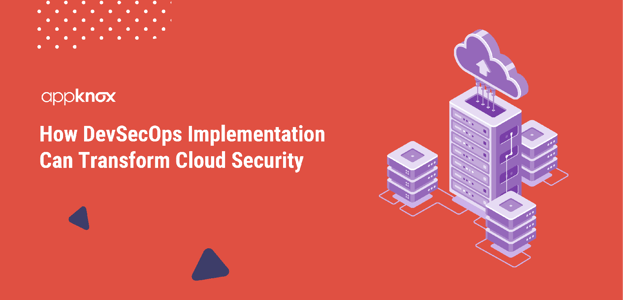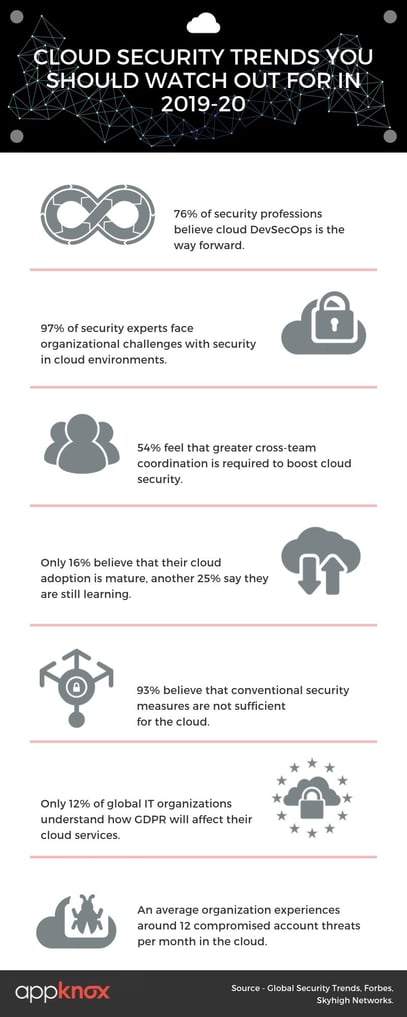
BLOG

BLOG
Businesses are becoming more and more reliant on cloud technology. This trend is poised to grow even further in the upcoming years. As companies continue to extend their resources on the cloud, the concern of security also intensifies further. However, with the advent of DevSecOps, the face of cloud security has completely transformed.
Security is now being seamlessly blended into the software development cycle. DevSecOps ensures the integration of security across all stages of the process chain and guarantees the security of cloud infrastructures more than ever. It is surely breaking the chains of the past and also the trend of treating security as a distinct process.
Below infographic highlights the key cloud security trends for 2019-2020 that further intensifies the need for cloud devsecops.

Technology firms all around the world are striving towards scalability with all-round digital transformation. The past years have seen a widespread penetration of leading cloud service providers in the IT industry. Organizations like Microsoft Azure, Amazon Web Services, IBM Cloud, Google Cloud Platform among many others have reshaped the industry like never before. Yet, security concerns continue to threaten the operations of these cloud-based firms. And as more and more organizations begin to adopt cloud DevSecOps, the tides appear to be turning.
According to a report on global security trends in the cloud, around 45% of the security players believe that adopting cloud DevSecOps is a major organizational step towards fortifying cloud environments.
DevSecOps perfectly aligns security and operations into the development cycle and ensures the participation of everyone in terms of security and compliance. Implementing cloud DevSecOps demands detailed planning and collaboration on several fronts to achieve the desired cloud security advantage. Moreover, DevSecOps also eases out the process of cloud migration by reducing software risk and automating security checks.
For a sound DevSecOps implementation, the cloud security teams need to collaborate closely with other teams and monitor the quality of code throughout the production cycle. At first, all of this may seem confusing and a bit complicated, but a few practical and tested DevSecOps best practices may do the trick for your cloud platform. Here we talk about the six fundamental DevSecOps practices whose implementation may transform cloud security at your organization:
Customer needs are becoming more dynamic than ever. Correspondingly, the organizations must be flexible enough to rapidly change their software.
Cloud-based firms may sometimes have to change their codes several times a day. Under these circumstances, following old security models won’t be of much help. They might not be suitable for rapid delivery cycles and may derail the entire process. An agile approach, however, will help security teams to check for vulnerabilities continuously and enhance the quality assurance process. Even while migrating to the cloud, analyzing code will maintain software health throughout the cloud migration process.
Without a doubt, one of DevSecOps best practices is automated testing. It may be regarded as the primary driving force behind cloud DevSecOps.
Automated tests simplify the overall testing process by executing recurring tests and recording outcomes and results with much quicker feedback to the team. Running automated tests at all development stages may enhance the overall efficiency by eliminating errors with codes. This may also streamline the entire cloud migration process and make it easier to migrate more of your resources to the cloud.
DevSecOps efficiently integrates all the teams working together on a cloud project. As everyone is aware of what everybody else is doing, it becomes easy to tackle vulnerabilities, i.e. change management.
The change management process could be made even more efficient by empowering the teams with appropriate tools and expertise to neutralize security woes before they hamper cloud security even further. Giving the freedom of making necessary security changes to the development teams may also enhance their productivity even further.
Cloud-based platforms manage gigantic sizes of data. Under such scenarios, complying with strict security regulations like GDPR, HIPAA and SOC 2 may become a troublesome task.
Adopting cloud DevSecOps may change this picture and also ease out any extra burden caused during times of regulatory audits. Development teams may gather evidence of compliance in real-time whenever new codes are written or existing ones are changed. This would assist the organization in being prepared for any out of the box situations.
Newly added code may result in consequent vulnerabilities which need to be investigated, discovered and remediated. Ongoing periodic security checks are therefore necessary. Generally, a vast majority of successful cyber-attacks happen because of human error. Therefore, regular scans, code reviews, and penetration tests are bound to make an intricate difference to the existing cloud security scenario.
Training of Personnel: Security engineers should be empowered with security-specific trainings. This could be done either by sending them to conferences that are cloud-oriented or by investing in security certification programs. MOOCs from MIT and Harvard Extension School and industry conferences like DEF CON and Black Hat can prove beneficial.
The major challenge that remains with security, specifically in the cloud, is to deal with attacks that are cloud-based. Apart from continuously monitoring everyday activities, it is also important to assure users that their information stays properly secured. And it won’t be an overstatement when we say that DevSecOps best practices have emerged as saviors of cloud technology.
Cloud DevSecOps is necessary to keep a continuous check on speed, agility, and innovation while simultaneously staying alert for malicious cyber threats. Under the mantra of DevSecOps, maintenance of this balancing act is quite easy and often most scalable. Therefore, in order to avoid any chances of regret, you should better start practicing it, right from day one.
.jpg?width=50&height=50&name=10606600_10204086667262761_7381430219125488912_n%20(1).jpg)
Hackers never rest. Neither should your security!
Stay ahead of emerging threats, vulnerabilities, and best practices in mobile app security—delivered straight to your inbox.
![]() Exclusive insights. Zero fluff. Absolute security.
Exclusive insights. Zero fluff. Absolute security.
![]() Join the Appknox Security Insider Newsletter!
Join the Appknox Security Insider Newsletter!
